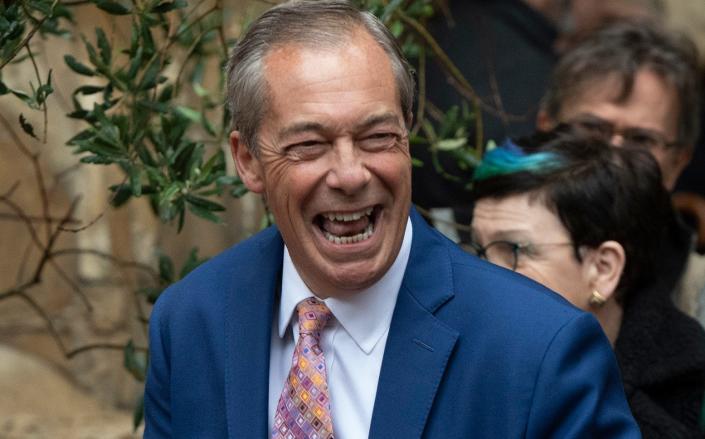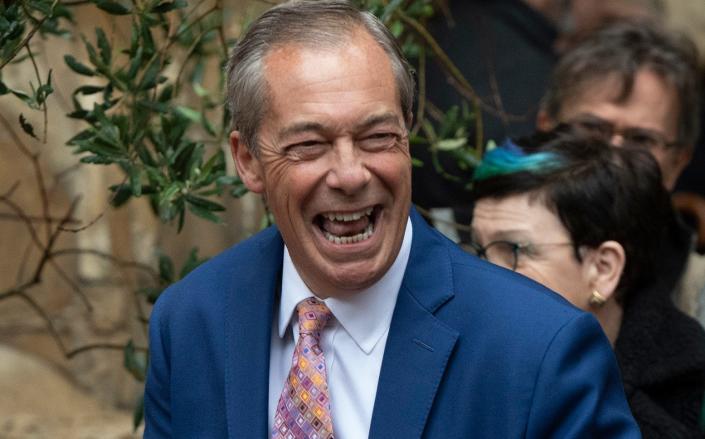
Nigel Farage has hinted at a return to frontline politics to “crush” what he described as a Tory plot to “betray Brexit”.
Ministers have insisted there is no question of tearing up the Brexit deal in the hope of securing a closer, Swiss-style relationship with Brussels.
A report that Rishi Sunak’s Government is considering putting the UK on the road to closer ties with the European Union has alarmed Brexiteers but Downing Street and senior ministers sought to play down the speculation.
The Sunday Times reported “senior government figures” were planning to put the UK on a path towards arrangements similar to Switzerland’s to ensure access to the EU’s single market.
The model would involve more liberal EU migration – although full free movement would not be on the table – and payments to the Brussels budget, the newspaper reported.
Mr Farage, who was a pivotal figure within the Leave movement, said: “This level of betrayal will never be forgiven. The Tories must be crushed.”
He later told The Sun: “Their denials do not convince me at all.
“This is rather like the Chequers moment – the Tory party collapsed to 8 per cent in the elections after that and it looks like they are heading that way again.
“Let’s see what happens, I’m not ruling anything out.. If they really do betray Brexit, I would have to do something.”
Immigration minister Robert Jenrick said it “couldn’t be further from the truth” and insisted the “fundamental tenets” of the Brexit deal signed by Boris Johnson would not be renegotiated.
But on Monday morning Mr Jenrick said there is “no question whatsoever” of the UK reopening the deal with the EU.
“We have a settled position on our relationship with the European Union, that’s the deal that was struck in 2019 and 2020 – and that’s the one that we intend to stick to,” he told TalkTV.
“That sets out the fundamental position that we don’t want to see a return to free movement, we don’t want to have the jurisdiction of European judges in the UK, and we don’t want to be paying any money to the European Union.
“Of course there will be things on which we can improve our relationship – trade, security, migration are all key topics, and the Prime Minister wants to have the most productive relationship possible with our European friends and neighbours.
“But there’s no question whatsoever of us reopening the fundamental tenets of that deal.”
On Sky News, he added: “Money, free movement, jurisdiction of European judges: these are really important things that were discussed at length within the Conservative Party, within the country, a few years ago.
“We chose our position. I think it’s broadly the right one, because we did that for a reason.”
A Government spokesperson labelled the Sunday Times story “categorically untrue”.
The spokesperson said: “This Government is focused on using our Brexit freedoms to create opportunities that drive growth and strengthen our economy.
“Brexit means we will never again have to accept a relationship with Europe that would see a return to freedom of movement, unnecessary payments to the European Union or jeopardise the full benefit of trade deals we are now able to strike around the world.”
Switzerland and the EU have a close economic relationship based on a series of bilateral agreements, giving the country direct access to parts of the EU’s internal market including the free movement of people.
The UK is locked in long-running talks with the EU over the Northern Ireland Protocol, a post-Brexit arrangement for the region designed to avoid a border on the island of Ireland.
Unionists have opposed the protocol as impeding trade between Northern Ireland and Great Britain, placing a border in the Irish Sea.
This has resulted in the collapse of the Stormont Assembly, with top civil servants left to run government departments.
However, there have been renewed hopes in recent weeks that a deal can be secured and the relationship improved between the UK and the EU after years of tensions.
A Swiss-style veterinary agreement has been one of the options mooted by some on the EU side as a solution to the protocol dispute.




